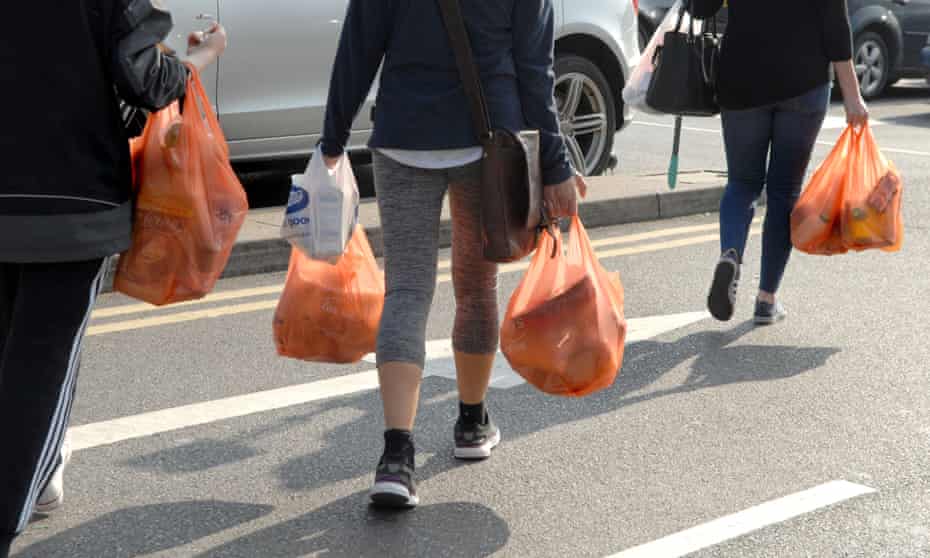Analysis of 1m loyalty card transactions suggests decline is mostly down to levy on single-use bags

Wales introduced the UK’s first levy on single-use plastic bags in 2011, followed by Northern Ireland in 2013, Scotland in 2014 and England in 2015. Photograph: Gill Allen/Rex/Shutterstock
PA Media
Mon 27 Dec 2021
Shoppers have been shunning single-use plastic bags to save pennies rather than the planet, a “big data” study of more than 10,000 consumers has found.
The research by Nottingham University business school’s N/LAB analytics centre of excellence suggests the massive decline in plastic bag use in the UK may have little to do with shoppers’ concern for the environment.
The study drew on more than 1m loyalty card transactions to explore the psychological and demographic predictors of single-use bag purchases.
Researchers found bags are most likely to be bought by younger shoppers who are often male and less frugal but whose environmental concerns do not affect their decisions to buy or not.
The findings emerged with plastic bag consumption at its annual peak during the festive period, despite all retailers in England being legally required to charge 10p per bag.
The study co-author Dr James Goulding, N/LAB’s associate director, said: “Until now very little was known about the people who still regularly buy plastic bags – or those who don’t.
“Previous research has tended to focus exclusively on consumers’ personalities or motivations not, crucially, on whether an individual’s beliefs actually translate into action in the real world.
“Our approach recognises that people today leave in their wake a substantial amount of data that can help do social good and shed significant light on how they really behave in practice.”
Identified from the original dataset of 1,284,825 transactions at 1,222 stores, more than 10,000 consumers participated in a questionnaire exploring their circumstances, traits and environmental opinions.
Their survey responses were linked to their purchasing data, and a machine-learning algorithm was then used to determine the factors that actually predicted bag-buying behaviour.
The survey included questions about views on environmental considerations in general and climate change in particular, but these were found to have little influence on purchasing decisions.
Dr Gavin Smith, an associate professor in analytics, said: “We expected our findings would show infrequent bag-buyers are at least partly motivated by a desire to save money.
“But what we didn’t expect, not least given environmentalism’s role in underpinning the levy on plastic bags, was that environmental concerns wouldn’t predict consumption at all.
“This suggests future campaigns to further reduce plastic bag consumption might benefit from different messaging. It’s a matter of understanding whom to target, how and when.”
Amid growing concerns over the contribution plastic bags make to pollution and litter, Wales introduced the UK’s first levy in 2011, with Northern Ireland following in 2013 and Scotland in 2014.
In 2015, the year after its seven biggest supermarkets gave away more than 7.6bn single-use bags, England introduced its own 5p levy, which doubled to a minimum of 10p in May this year and was extended to all retailers.
PA Media
Mon 27 Dec 2021
Shoppers have been shunning single-use plastic bags to save pennies rather than the planet, a “big data” study of more than 10,000 consumers has found.
The research by Nottingham University business school’s N/LAB analytics centre of excellence suggests the massive decline in plastic bag use in the UK may have little to do with shoppers’ concern for the environment.
The study drew on more than 1m loyalty card transactions to explore the psychological and demographic predictors of single-use bag purchases.
Researchers found bags are most likely to be bought by younger shoppers who are often male and less frugal but whose environmental concerns do not affect their decisions to buy or not.
The findings emerged with plastic bag consumption at its annual peak during the festive period, despite all retailers in England being legally required to charge 10p per bag.
The study co-author Dr James Goulding, N/LAB’s associate director, said: “Until now very little was known about the people who still regularly buy plastic bags – or those who don’t.
“Previous research has tended to focus exclusively on consumers’ personalities or motivations not, crucially, on whether an individual’s beliefs actually translate into action in the real world.
“Our approach recognises that people today leave in their wake a substantial amount of data that can help do social good and shed significant light on how they really behave in practice.”
Identified from the original dataset of 1,284,825 transactions at 1,222 stores, more than 10,000 consumers participated in a questionnaire exploring their circumstances, traits and environmental opinions.
Their survey responses were linked to their purchasing data, and a machine-learning algorithm was then used to determine the factors that actually predicted bag-buying behaviour.
The survey included questions about views on environmental considerations in general and climate change in particular, but these were found to have little influence on purchasing decisions.
Dr Gavin Smith, an associate professor in analytics, said: “We expected our findings would show infrequent bag-buyers are at least partly motivated by a desire to save money.
“But what we didn’t expect, not least given environmentalism’s role in underpinning the levy on plastic bags, was that environmental concerns wouldn’t predict consumption at all.
“This suggests future campaigns to further reduce plastic bag consumption might benefit from different messaging. It’s a matter of understanding whom to target, how and when.”
Amid growing concerns over the contribution plastic bags make to pollution and litter, Wales introduced the UK’s first levy in 2011, with Northern Ireland following in 2013 and Scotland in 2014.
In 2015, the year after its seven biggest supermarkets gave away more than 7.6bn single-use bags, England introduced its own 5p levy, which doubled to a minimum of 10p in May this year and was extended to all retailers.
No comments:
Post a Comment